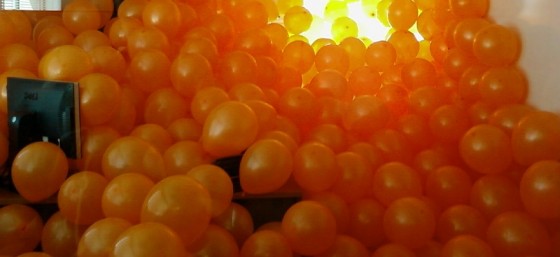
Punking Neal’s Office: The glow of the prankster god by Jake Sutton from Flickr (Creative Commons License)
This is the time of year that high school seniors are scheming about their senior prank instead of studying for finals. If you’re going to do a senior prank, think about all the things that might go wrong (especially if people show up drunk or high or get carried away) or that you might be accused of doing wrong and try to mitigate those types of problems in advance.
Just being on the school property after hours might be enough to get you arrested for trespassing and the charges could be worse if you break into the school. Your state or city may also have a catch-all law like malicious mischief or disturbing the peace. Your city might have a curfew law so you want to be careful if anyone participating is under 18. On the flip side, if you’re 18 and you get arrested, you will be charged as an adult and your name will likely appear in your local newspaper.
Regardless of your age, getting arrest curing your senior prank could result in you incurring legal fees and fines, being banned from graduation activities, having your college acceptance rescinded, and being fired from your job if you’re at-will employee.
If you’re going to do a senior prank, do your homework in advance. Look around your school for security cameras, motion sensors, and security guards. And talk with your fellow conspirators in advance about your plans, what you need to do to stay out of trouble, and not sharing pictures and videos of your shenanigans if you take any at all (which I don’t recommend).
Senior pranks should be creative and fun for everyone – including the school administration. I did some research and these are some of the pranks that made me smile: forking the lawn, filling the hallway with cups of water, putting a car on the roof or around the flag pole, making interesting pictures/patterns on the walls with post-it notes, filling a prominent room with balloons, messing with people’s head with matching outfits or re-enacting scenes from a movie or video game, hiding small battery-operated alarm clocks all over campus – each set to go off at a different time, putting googly eyes and mustaches on inanimate objects, constructing a swing set somewhere, covering the lawn with gnomes or plastic flamingos, or filling the pool with rubber ducks.
So here’s my list of senior prank dos and don’ts as a prankster and a lawyer:
- Be innocuous
- Be funny – You’re less likely to get in trouble if the alleged victims are laughing
- Be witty
- Be creative – What if you filled the principals’ office with canned goods and at the end of the day, it all went to a food bank
- Be easy enough to clean up
- Be safe – Don’t create a hazard with oil, bouncy balls in the hallways
- Be temporary – Don’t graffiti the school
- Be clean – Don’t spill trash cans or spray silly string everywhere
- Don’t steal anything – This includes stealing keys to get into the school
- Don’t destroy, damage, or vandalize anything
- Don’t be gross – Don’t do want those kids in New Jersey did and pee on the floor.
For full disclosure, I participated in my class’ senior prank when I was in high school. We had to be super cheesy and harmless because the previous two years’ classes were destructive and people got arrested. I was 17 at the time (and breaking curfew) and my parents explicitly told me not to call home until after breakfast if I got arrested. We had fun and nothing bad happened.
If you have any questions about the legalities of flash mobs or pranks, feel free to contact me. If you want a resource about the legal dos and don’ts about these topics, please check out my book, Flash Mob Law.
You can also connect with me on Twitter, Google+, Facebook, YouTube, LinkedIn, and you can subscribe to the Carter Law Firm newsletter.
Please visit my homepage for more information about Carter Law Firm.